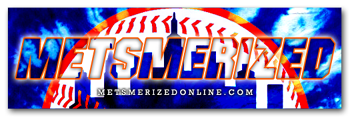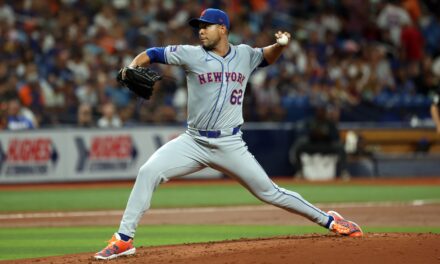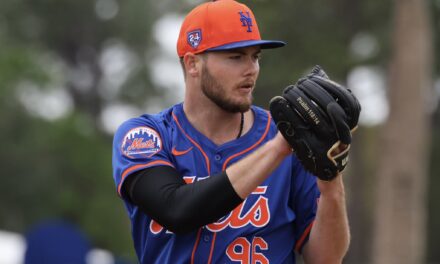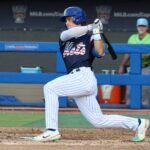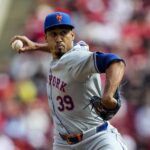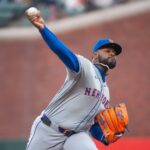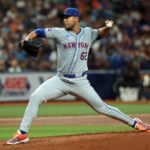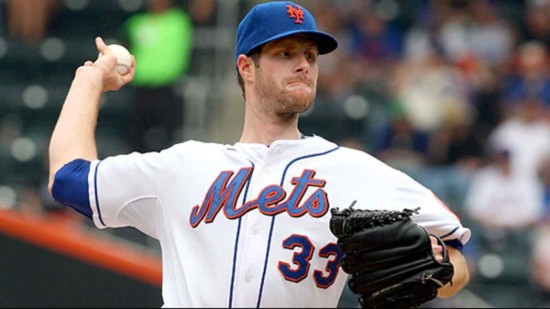
Baseball players tend to disappear after retirement. Without the spotlight of national media, or admiration of thousands of fans, they fade back into mainstream society. They leave only memories, and their absence from the game makes it easy to forget that these guys we watched on TV are still real people. My mission is to make fans remember these forgotten players by having them talk to us and answer our burning question, “Where are they now?”
Today I chatted with former pitcher John Maine, one of the few Mets of the millenium who remembers playoff baseball in Flushing. Here he is, reflecting on his time with the team.
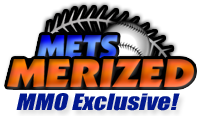 Noah: What was your favorite memory from your time with the Mets?
Noah: What was your favorite memory from your time with the Mets?
John: Probably the playoffs in 2006. Pitching in the playoffs no matter where you are is an experience, but doing it in New York City; that was pretty awesome. Even in 2007 and 2008, where we ultimately lost out, but we were in the thick of it, we played a lot of exciting, wire to wire “every game matters” baseball. That was a lot of fun.
Noah: Are there any specific games or moments that stick out in your mind?
John: If I had to boil it down to one specific moment, I guess I would say game 6 of the NLCS. We were down 3-2 in the series and if we lost, we would have been done for the season. But we won, forcing a game 7, that was very exciting.
Another one would be my last start (the second to last game) of the 2007 season against the Marlins where I almost had a no-hitter. That again was a do or die game that we had to win, and I’m glad that I had the opportunity to pitch.
Noah: Was there any player or coach who shaped you not just as a baseball player, but as an individual as well?
John: Rick Peterson was my first pitching coach in New York and he shaped me as both a pitcher and as an individual. I learned a lot from him, not just about pitching mechanics, but also about the mental aspect of baseball. Of course that helped me out a lot with pitching, but more importantly, it helped me in life. Everything is a mental game, it’s how you prepare for things and how you deal with stuff thrown in your path. It’s really given me a better outlook on life.
I also had the pleasure of playing with Tom Glavine, Pedro Martinez, and Billy Wagner. All guys with loads of big league experience, I learned a ton about pitching and baseball from them.
Noah: You also played under Willie Randolph, a manager that Mets fans didn’t always appreciate because of his reserved nature. What was he like behind closed doors?
John: Willie was a player’s coach. He would come up to you and he was personable, he was willing to discuss things that were bothering you, not necessarily about baseball. He had an open door to his office and he always wanted to talk with his players and get to know them not just as players, but as people too.
I understand that in New York, fans like coaches that get fired up, but that doesn’t always translate into combining successful players to make a successful team. I think Willie handled New York perfectly and I really enjoyed him as a manager.
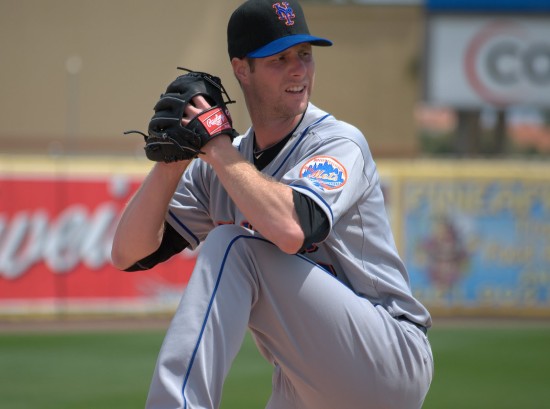
Noah: What have you done since moving on from professional baseball?
John: After I was released by the Marlins in 2013 (after two shoulder surgeries) I realized that I wasn’t the same pitcher and I wasn’t going to embarrass myself on the field so I decided to retire. Now I have two young girls, and I get the pleasure to stay home and watch them grow up. I also moved down south after I retired. I went to school at UNC Charlotte and I started helping out with coaching the pitchers on the baseball team.
Noah: What do you see in this current Mets team? How far do you see them going this year?
John: Honestly, I haven’t kept up with much baseball at all, let alone the Mets. From what I see, they have a young team, and their pitching is outstanding, from top to bottom. Whenever a team has good pitching, they’re always going to be in it, contending. I think the Mets will also be helped by a division that is a little less stacked than in the past. They’ll be competitive, they still have guys that can hit too. For what it’s worth, I hope they do well because I actually grew up as a Mets fan, I really want them to win.
Noah: One of those guys that can still hit is David Wright. You played with him back when he was just two years into his major league career, and back then he was just a piece of a very talented team, now he is the leader of an equally talented team. Could you talk about his maturation into a leader?
John: David was with the Mets before me, but when he came up, he was obviously a stud. He’s a big name, one of the best players in baseball. I think that one of the best things about the Mets was that there were a lot of guys with 10 or 15 years of experience. He got to learn from guys that handled themselves the right way. Guys like Glavine, Carlos Delgado, and Pedro Martinez all practiced and played the right way. In addition they were also great clubhouse presences. As those older guys started to leave, David became the face of the team, the longest tenured Met, and he is now teaching the younger players now how to conduct themselves, how to properly do things at the stadium. He’s really taken on a mentor role.
Noah: If you could share any message with Mets fans today, what would it be?
John: I wish I was still playing and I wish that I did better in my time with the Mets. I don’t have any regrets, I worked hard, but I really wish that I could have been a better player.
Noah: Lastly, what was it like to hit a homerun at Shea Stadium?
John: It was pretty cool. I didn’t hit in college, didn’t hit when I got drafted by the Orioles, so when I was traded to the Mets, I hadn’t picked up a bat in seven years. Needless to say, I was God awful when I first started swinging at the plate. Still, I worked at it, and I got to be decent. I guess anybody who goes up to bat swinging can run into one, and that’s what I did. To be honest, I thought that it was going to be a pop fly to the left fielder. But I heard the crowd roar and saw the umpire circling his finger in the air, and I realized that I just homered.
